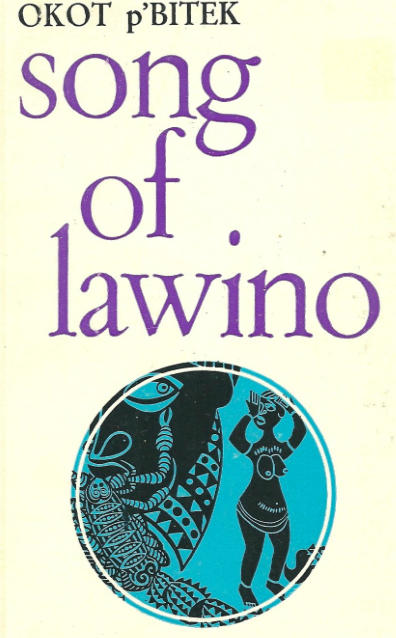Kuperekedzwa ... walking with you halfway to say goodbye

This is my final post in the inaugural commentary series on African Poetry. I’ve barely scratched the surface, and I have new respect for the many wonderful blogs on African expressive culture, and particularly writing, that have flourished in the last few years. The rhythm of my posts has been syncopated, and in signing off, I’d like to point to a few sites that update more regularly, and to some exciting projects coming soon.
Africa in Words is one of the most exciting literary digests for African writing. They recently featured a spotlight on Souffles, the major Maghrebi (north African writing in French) journal celebrating its 50th year. If you enjoyed Brahim El-Gaubli’s introduction to Morrocan poet Mohamed Saghir Ouled Ahmed, you’ll want to read this essay.
Another major 50th anniversary this year is that of Okot p’Bitek’s Song of Lawino. [if you have access to a good library, the book is available in electronic form through the online selection of the Heineman African Writers Series]. Originally composed in both Acholi and English, the poem sequence reflected p’Bitek’s reinvention of the lyric voice between song and ethnography, and in an English that danced Acholi masquerade and continues to influence African poets across the continent. Uganda’s Makerere University, site of the fabled writers conference of 1962, will host a conference in celebration of the anniversary on March 18 in Kampala. Keep a look out for proceedings from the conference. And for more on the poem check out Jahan Ramazani’s work in The Hybrid Muse.
And speaking of Uganda…Prairie Schooner has an ongoing collaborative site, Fusion #11, which recently featured a set of Ugandan and American poets side-by-side. The issue features 15 poets’ takes on shoes, and in selecting them, the editor and one of the great forces behind Uganda’s vibrant poetry scene, Beverly Nsengiyunva wrote:
Reading over forty poems to select the final fifteen was like walking in each and every poet's shoes. I journaled their agonies as they poured over the throbbing ache of shoes tossed aside by an uncaring owner. Melissa Kiguwa's "Afro-Wanderings" provided the right rhythm to physical and spiritual journeys. It was remarkable to hear the voices of shoes, the baying of boots, to read from a Lillian Aujo's shoe diary and to read of an eerie animal connection in Mildred Barya's "Ode to the Sheep." Some poems took on a sexual hue, and never in my most imaginative or delirious state would I have transformed shoes into a podium to execute sex.
Nsengiyunva is both a poet and a cultural administrator, and her most important work may be in founding the Babishai Niwe poetry organization which sponsors competitions and workshops in Uganda. She also directs a center for empowering women and girls in leadership.
The poets featured in Fusion include well-known names like Nick Makoha, whose one-man show, My Father and Other Super-heroes, has won rave reviews. Others may be new to American readers, and the humor and sass in their voices will need no translation. Rehema Nanfuka, for example, proves that red-shoe-obsession is a global pandemic:
They are a torture so pleasureable,
these cliché blood red, six inch heeled Jimmy Choos.
Leather so soft, so warm, so alive;
she feels the pulse of the sacrificed calf.
The shoes; a California socialite's castoffs,
bought by a Kampala social outcast.
In a few weeks the Brunel University African Poetry Prize will be announced. I had the privilege of serving as a judge this year, and I can assure you that the poets shortlisted will be every bit as good as the last few years. Here’s a sampling from last year’s co-winners, Nick Makoha (yes, that Nick) and Safia Elhillo (of Sudan). Safia will be publishing her first full-length collection, Asmarani, next year, as the winner of this years Sillerman First Book Prize sponsored by the African Poetry Book Fund. Sillerman Judge, Gabeba Baderoon praised Safia’s work: “The poems demonstrate a riveting sense of the power of language. They are alert to history and formally compelling as well…There is an alluring sense of wholeness to the collection. The themes flow convincingly from poem to poem, and the voice is so confident that I trust the speaker to lead me through sensitive and risky territory.” These young lions are ready to roar. So keep listening!
And to close with, if you’ve been following the year of amazing student activism in South Africa and want to learn more about the university poetry scene there you might want to check out INZYNC, part of the SLiPnet project at Stellenbosch University. Much of the activisim at other campuses, particularly UCT, Wits and University of the North, have deployed visual art/statues [#RhodesMustFall] in powerful ways, and it’s a good moment to reflect on how the aesthetic is never not political and how the language of poetry, symbols, remains also the language of politics.
Good news from Africa